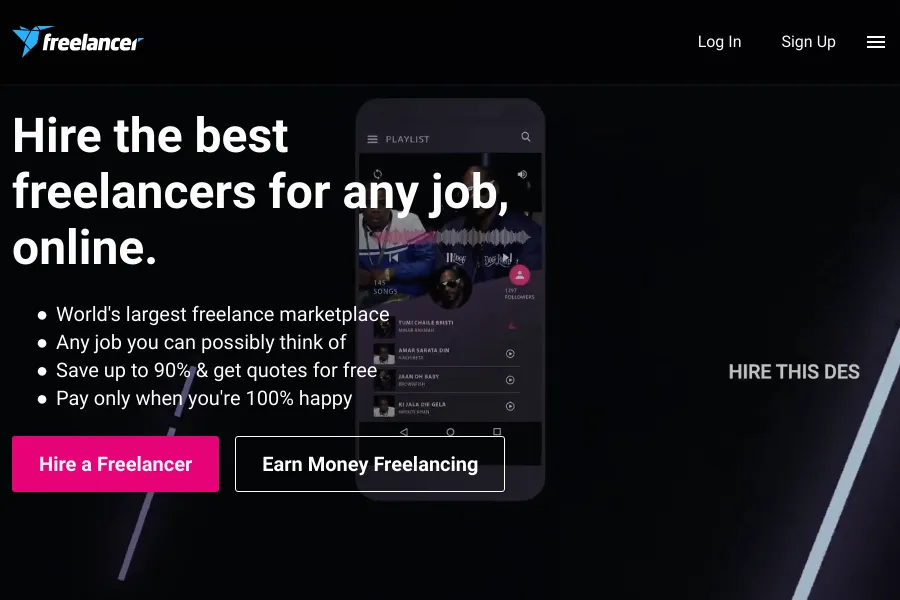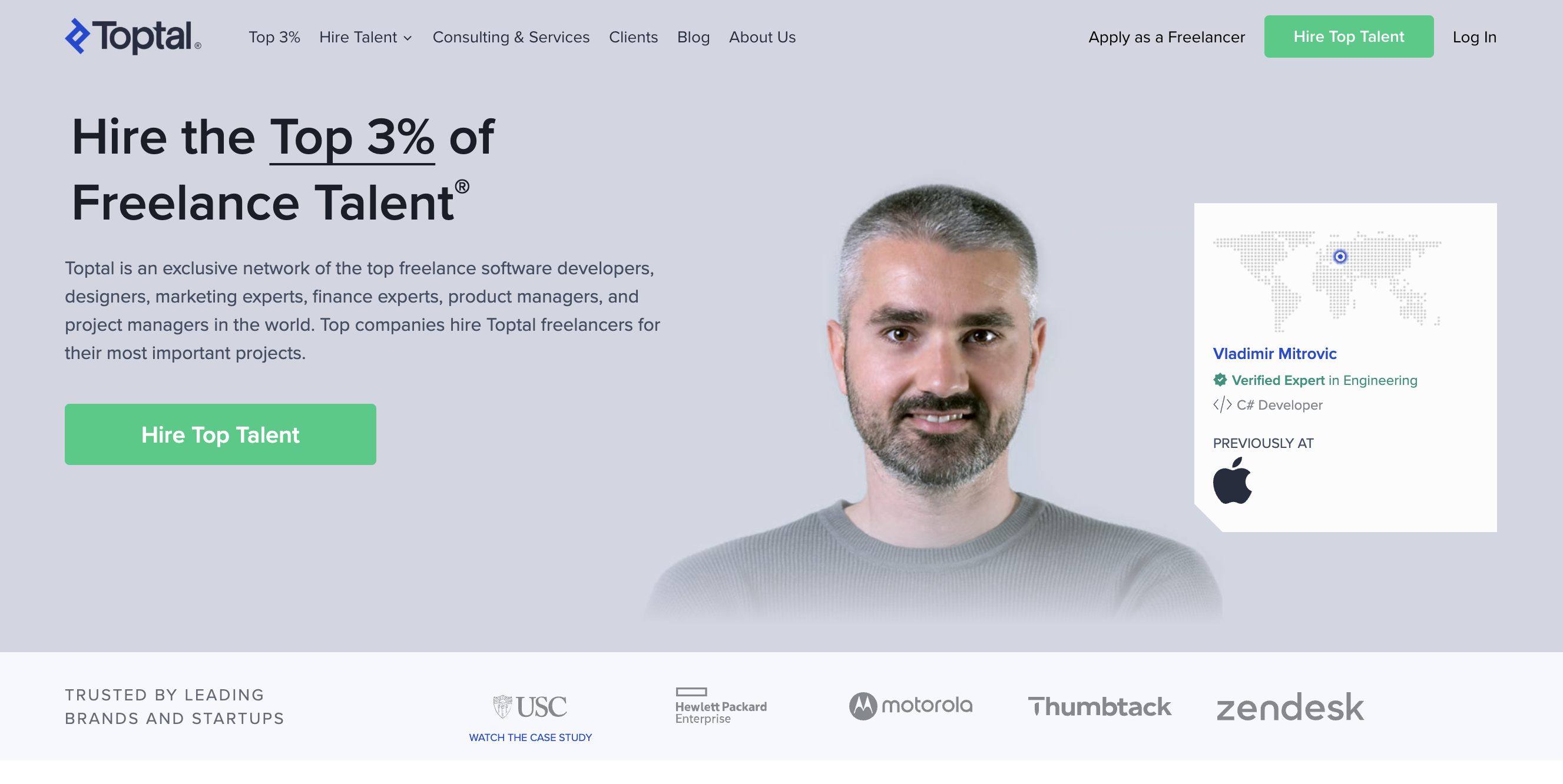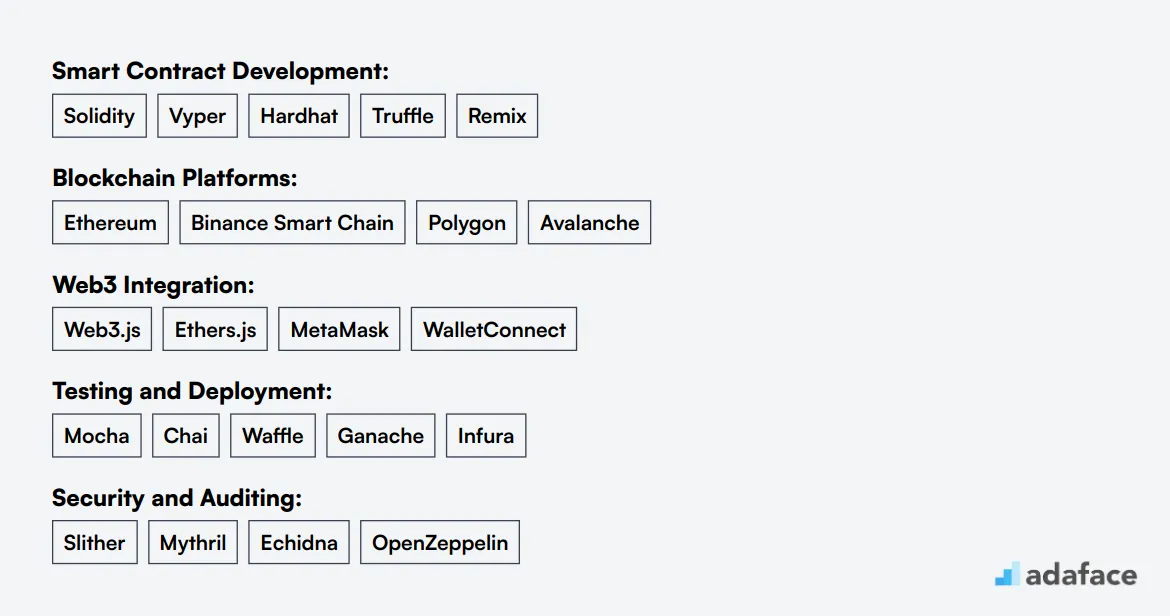In today's tech-driven world, hiring a Solidity Developer is critical for companies venturing into blockchain technology and smart contracts. Despite the growing demand, many recruiters struggle to identify candidates with the right mix of technical expertise and industry knowledge. Often, the oversight lies in not fully understanding the role's complexity and the unique skill sets required for effective blockchain development.
This article provides a roadmap for hiring managers on how to find and recruit the best Solidity Developers. We'll cover the role's responsibilities, the hiring process, and key qualifications to look for. Additionally, we'll guide you on writing a compelling job description, using skills assessments, and conducting interviews. Explore our detailed Solidity Developer interview questions to prepare for the recruitment process.
Table of contents
What Does a Solidity Developer Do?
A Solidity Developer specializes in creating smart contracts for blockchain platforms, primarily Ethereum. They write, test, and deploy code that automates transactions and enforces agreements without intermediaries.
The day-to-day responsibilities of a Solidity Developer include:
- Writing and optimizing smart contract code
- Debugging and testing contracts for security vulnerabilities
- Integrating blockchain solutions with existing systems
- Collaborating with teams to design decentralized applications (dApps)
- Staying updated on blockchain technology and best practices
- Documenting code and processes for future maintenance
Solidity Developer Hiring Process
The Solidity developer hiring process typically spans 4-8 weeks. Here's a quick overview of the timeline and steps involved:
- Create and post a detailed Solidity developer job description
- Review resumes and applications (1-2 weeks)
- Conduct initial screenings or phone interviews (3-5 days)
- Administer technical assessments or coding tests (1 week)
- Conduct in-depth technical interviews (1-2 weeks)
- Evaluate cultural fit and team compatibility (2-3 days)
- Make an offer and negotiate terms (3-5 days)
This process can be adjusted based on your company's needs and the urgency of the role. In the following sections, we'll dive deeper into each step, providing checklists and resources to help you find the best Solidity talent for your team.
Essential Skills and Qualifications for Hiring a Solidity Developer
Crafting the ideal candidate profile for a Solidity Developer can be tricky. Many recruiters may overlook the specific skills that are critical for this role, leading to mismatches in expectations. It's important to differentiate between what's required and what's preferred in candidates' skill sets.
Here are the key skills and qualifications to look for in a Solidity Developer:
Required Skills:
- Proficiency in Solidity and smart contract development
- Experience with Ethereum blockchain and EVM
- Strong understanding of blockchain fundamentals and cryptography
- Familiarity with Web3.js or Ethers.js
- Knowledge of security best practices in smart contract development
Preferred Skills:
- Experience with other blockchain platforms (e.g., Binance Smart Chain, Polygon)
- Familiarity with DeFi protocols and standards
- Knowledge of front-end development (JavaScript, React)
- Understanding of gas optimization techniques
- Contribution to open-source blockchain projects
| Required skills and qualifications | Preferred skills and qualifications |
|---|---|
| Proficiency in Solidity and smart contract development | Experience with other blockchain platforms (e.g., Binance Smart Chain, Polygon) |
| Experience with Ethereum blockchain and EVM | Familiarity with DeFi protocols and standards |
| Strong understanding of blockchain fundamentals and cryptography | Knowledge of front-end development (JavaScript, React) |
| Familiarity with Web3.js or Ethers.js | Understanding of gas optimization techniques |
| Knowledge of security best practices in smart contract development | Contribution to open-source blockchain projects |
How to write a Solidity Developer job description?
Once you have a candidate profile ready, the next step is to capture that information in the job description to attract the right candidates. A well-crafted job description can make a significant difference in your hiring process.
• Highlight key responsibilities and impact: Clearly outline the primary responsibilities of the Solidity Developer, such as smart contract development and testing, emphasizing how their contributions will drive blockchain projects forward. This clarity helps candidates understand the role's significance within your organization.
• Balance technical skills with soft skills: While it's important to list necessary technical competencies like proficiency in Solidity and familiarity with Ethereum, don't forget soft skills. Attributes such as teamwork, problem-solving, and adaptability are equally essential for a successful developer in a collaborative blockchain environment.
• Showcase unique selling points: Let candidates know what makes your company and the role appealing. Whether it's innovative projects, a thriving team culture, or growth opportunities, highlighting these factors can make your job listing stand out. For a detailed example, refer to the Solidity Developer job description.
Top Platforms to Find Solidity Developers
Now that you have a job description ready, it's time to list your opening on job platforms to attract Solidity developers. The right platform can significantly impact the quality and quantity of applications you receive. Let's explore some top options for finding skilled Solidity talent.
Upwork
Ideal for finding freelance Solidity developers for short-term or specific projects.

Freelancer
Useful for hiring freelancers with Solidity expertise for various project scopes and timeframes.

Toptal
Best for hiring top remote Solidity developers after a rigorous screening process.

Beyond these popular sites, there are several other platforms worth considering. These include AngelList for startups, CryptoJobsList for blockchain-specific roles, and community-driven platforms like Reddit's r/forhire. For full-time positions, LinkedIn remains a solid choice, while SmartContractor specializes in contract work. Technical platforms like Stack Overflow Jobs and GitHub Jobs are excellent for reaching developers with strong coding skills.
Key Keywords for Screening Solidity Developer Resumes
Resume screening is a practical first step in the hiring process, helping you quickly filter through numerous applicants before diving deeper into interviews. It allows you to focus your efforts on candidates who show promise of meeting your specific needs.

When manually screening resumes, look for keywords related to Solidity and smart contract development. Prioritize resumes mentioning skills like Ethereum, EVM, Web3.js, Ethers.js, and cryptography. This method helps you identify candidates with the foundational abilities needed for the role. For a detailed Solidity Developer job description, refer to the Adaface resource.
AI language models like Claude or ChatGPT can be handy tools in resume screening. Input the desired keywords and let the AI highlight candidates who match your criteria. This can streamline the process, allowing you to focus on the most relevant applicants.
Here's a prompt to guide AI in screening resumes:
TASK: Screen resumes to match job description for Solidity Developer role
INPUT: Resumes
OUTPUT: For each resume, provide the following information:
- Email id
- Name
- Matching keywords
- Score (out of 10 based on keywords matched)
- Recommendation (detailed recommendation of whether to shortlist this candidate or not)
- Shortlist (Yes, No, or Maybe)
RULES:
- If unsure about a candidate's fit, mark as Maybe instead of No
- Keep recommendation concise.
KEYWORDS DATA:
- Solidity
- Ethereum, EVM
- Web3.js, Ethers.js
- Cryptography
- Security best practices
For more on interview questions, you can explore Adaface's blog.
Recommended Skills Tests to Screen Solidity Developers
When hiring a Solidity Developer, skills tests are recommended to verify the candidate's proficiency in blockchain development and smart contract programming. These tests help ensure that the candidate possesses the technical abilities required to succeed in your organization.
The Solidity Coding Test is specifically designed to evaluate a developer's understanding of the Solidity language. This test assesses their ability to write secure and efficient smart contracts, which is a critical skill for blockchain applications. Solidity Coding Test
For a more general assessment, consider the Blockchain Developer Online Test. This test evaluates the candidate's overall knowledge of blockchain concepts and technologies beyond just Solidity, providing a broader understanding of their skill set. Blockchain Developer Online Test
A Javascript Online Test can be useful as Solidity shares syntax similarities with JavaScript, and many blockchain projects involve using JavaScript for front-end or integration purposes. This test can help gauge the candidate's familiarity with JavaScript programming. Javascript Online Test
If your application relies on a full-stack environment, the Full Stack Developer Test can be beneficial. This test covers various technologies, including back-end, front-end, and database knowledge, providing insights into a candidate's ability to handle diverse development tasks. Full Stack Developer Test
Finally, a Node.js Test is relevant since many blockchain platforms, such as Ethereum, commonly use Node.js for developing decentralized applications (dApps). This test will help evaluate the candidate's expertise in using Node.js within the blockchain context. Node.js Test
Effective Case Study Assignments for Hiring Solidity Developers
Case study assignments are valuable tools in assessing Solidity developers, but they come with challenges like being time-consuming and potentially deterring talent due to their length. It's essential to choose assignments that are engaging and reflective of real-world tasks. Here are some recommended case study assignments tailored to assess Solidity developers.
Smart Contract Design and Implementation: This assignment involves designing and implementing a smart contract for a hypothetical project. It evaluates a candidate's ability to write secure and efficient contracts, an essential skill for any Solidity developer. Understanding the nuances of smart contract development ensures candidates can handle real-world blockchain applications.
Security Audit of Existing Contracts: Candidates are given a pre-written smart contract to audit for potential vulnerabilities. This task tests their understanding of Solidity's security best practices, crucial for preventing exploits in deployed contracts. Thorough audits are a key part of maintaining blockchain integrity.
Gas Optimization Challenge: This case study requires developers to optimize a given smart contract to reduce gas usage without altering functionality. It assesses a developer's skills in writing cost-effective code, a significant consideration in blockchain projects due to transaction costs. Optimized contracts contribute to project sustainability and efficiency.
Structuring Technical Interviews for Solidity Developers
After candidates pass initial skills tests, it's crucial to conduct technical interviews to thoroughly assess their Solidity expertise. While skills tests help filter out unqualified applicants, technical interviews are key to identifying the best fit for your team. Let's explore some effective questions to ask during these interviews.
Consider including these questions: 1) 'Explain the difference between memory and storage in Solidity.' 2) 'How do you optimize gas costs in smart contracts?' 3) 'Describe a real-world use case for a smart contract you've developed.' 4) 'What security measures do you implement in your Solidity code?' 5) 'How do you handle version compatibility issues in Solidity?' These questions help evaluate a candidate's practical knowledge, problem-solving skills, and understanding of Solidity's nuances.
What's the difference between a Smart Contract Developer and a Blockchain Developer?
At first glance, Smart Contract Developers and Blockchain Developers might seem interchangeable, but their roles and responsibilities differ significantly. This confusion arises because both roles involve working with blockchain technology, yet their focus and skill sets diverge markedly.
A Smart Contract Developer primarily concentrates on creating and testing smart contracts using programming languages like Solidity and Vyper. They focus on ensuring the contracts' security, addressing potential vulnerabilities, and typically utilize tools such as Truffle and Hardhat. Their expertise is often sought after at entry to mid-level roles.
In contrast, a Blockchain Developer encompasses a broader scope, focusing on the entire blockchain infrastructure. They develop blockchain protocols and work with a wider array of programming languages, including Solidity, C++, Python, and Go. They are responsible for ensuring network security and perform extensive testing of networks and protocols. Often, this role requires more experience, typically at a mid to senior level. For individuals and teams looking to understand the skills needed for a Blockchain Developer, exploring skills required for a blockchain developer can be beneficial.
| Smart Contract Developer | Blockchain Developer | |
|---|---|---|
| Focus Area | Smart Contracts | Entire Blockchain |
| Programming Languages | Solidity, Vyper | Solidity, C++, Python, Go |
| Core Responsibility | Develop Smart Contracts | Develop Blockchain Protocols |
| Tools and Frameworks | Truffle, Hardhat | Hyperledger, Ethereum |
| Experience Level | Entry to Mid-level | Mid to Senior-level |
| Security Focus | Contract Vulnerabilities | Network Security |
| Testing | Contract Testing | Network and Protocol Testing |
| Deployment | Deploy Contracts | Deploy Chains/Nodes |
What are the ranks of Solidity Developers?
Understanding the different ranks of Solidity developers can be confusing, especially with the overlapping roles in the fast-evolving blockchain industry. Differentiating these roles is key to hiring the right talent for your team.
Junior Solidity Developer: This is an entry-level position typically filled by developers with a basic understanding of Solidity and blockchain technology. Their primary focus is learning and supporting the development team by writing simple smart contracts and fixing bugs.
Mid-level Solidity Developer: A step up, mid-level developers have a few years of experience. They handle more complex coding tasks and may begin to take on project responsibilities. They are skilled in writing, testing, and deploying smart contracts, ensuring they meet security standards.
Senior Solidity Developer: With extensive experience, senior developers are expected to lead and mentor junior team members. They design architecture for large-scale applications and address sophisticated blockchain issues. They often interact with project stakeholders and make decisions that impact the development process.
Solidity Architect: At the top level, architects create the blockchain architecture and establish best practices for the development team. They ensure that the technical direction aligns with the overall company strategy. Their role is critical in guiding the project's success.
For more information on what a Solidity developer does, you can refer to the job description for Solidity developers.
Hire the Right Solidity Developers for Your Team
In this guide, we've explored the role of a Solidity Developer, the steps in the hiring process, and the necessary skills and qualifications to look for. We've also discussed how to craft a compelling job description, where to find talented developers, and how to structure interviews for maximum effectiveness.
If there's one key takeaway from this post, it's the importance of using clear job descriptions and targeted skills tests to ensure accurate hiring. Utilizing tools like Solidity coding tests can help you assess the candidate's proficiency and fit for your team. You can find a Solidity Developer coding test to streamline your recruiting process.
Solidity Test
FAQs
A Solidity Developer specializes in creating smart contracts and decentralized applications on the Ethereum blockchain, utilizing the Solidity programming language.
Key skills include proficiency in Solidity, understanding of blockchain architecture, knowledge of Ethereum, and experience with tools like Remix and Truffle.
Start by outlining the role's responsibilities and required skills, then include details about your company and the projects the developer will be working on. Be specific about your needs to attract qualified candidates.
Top platforms for finding Solidity Developers include LinkedIn, GitHub, blockchain job boards, and freelance sites like Upwork and Toptal.
Common questions cover understanding of blockchain technology, previous experience with smart contracts, and problem-solving skills related to Ethereum development.
Utilizing skills assessments, like coding tests, can help evaluate candidates' proficiency in Solidity and their ability to develop secure and efficient smart contracts.
A Smart Contract Developer focuses on building self-executing contracts on blockchains like Ethereum, whereas a Blockchain Developer might work on building the blockchain itself or other blockchain-based applications.

40 min skill tests.
No trick questions.
Accurate shortlisting.
We make it easy for you to find the best candidates in your pipeline with a 40 min skills test.
Try for freeRelated posts
Free resources



